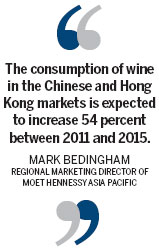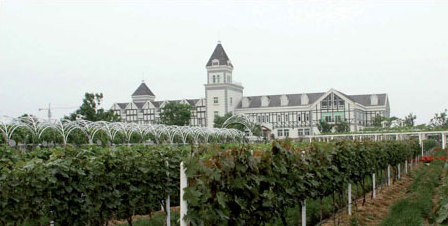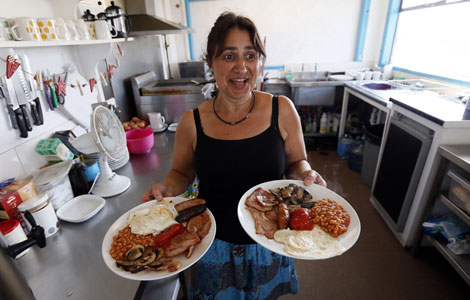Wine is the king of the castle
Updated: 2013-09-27 09:42
By Li Aoxue (China Daily)
|
|||||||||||
Chinese chateaus draw people to a world of fine imbibing
Call it what you like - a castle, a castel, or a chateau - Changyu Pioneer Wine Co's black-and-white-finished pile of bricks in Yantai, Shandong province, is designed to have pulling power.
Zhou Hongjiang, general manager of Changyu Pioneer Wine Co, believes Chateau Changyu-Castel not only sharpens the company's competitive edge but is a tourist attraction for Yantai, Changyu's hometown.
Anyone happening on the chateau on a fine day, with its surrounding vineyard-covered mountains and plains, might well double-check their roadmap to see that they had not taken the wrong turning and ended up in deepest France.
Chateau Changyu-Castel opened in 2002 and is a joint venture between Changyu Pioneer Wine Co, one of the top three Chinese wine producers, and the Castel Group, whose headquarters are in Bordeaux.
Blessed with sea, sand and sun, the chateau and its surrounds cover 135 hectares that produce famous wine-producing grapes such as cabernet gernischt, chardonnay and cabernet sauvignon to the tune of 3,000 metric tons of wine a year.
The design is aimed at attracting wine lovers in summer who can sample the best drops as they eat seafood and are cooled by the seaside breeze, all the while indulging their fantasies of being in Europe.
Yantai is roughly on the same latitude as Bordeaux, and the sunlight, temperature and soil are helpful elements in its grape growing.

Since Chateau Changyu-Castel opened 13 years ago many foreign wine experts, including Robert Tinlot, honorary president of the International Organization of Vine and Wine, and John Salvi, English Master of Wine, have been lavish in their praise.
Tinlot says it is a highly professional and attractive chateau, comparable with its European counterparts.
Salvi says he was impressed by a guard bar designed to protect workers in the fermentation plant. It gave a human dimension to the design, he says, adding that in Bordeaux many workers are injured in falls because of poor safety measures.
Guo Shuquan, a Chinese wine scholar, says he enjoys visiting the chateau not only for the drink but also because it helps promote wine culture.
"Tourists are allowed to help pick grapes, visit the wine cellar, taste premium wines and have wine appreciation lessons, and that all helps wine lovers learn more about wine," he says.
Along with another chateau, Chateau Changyu AFIP Global, and Changyu Wine Culture Museum, in Yantai, Changyu Pioneer Wine Co receives about 500,000 visitors a year. The three have become popular tourist destinations for experiencing wine culture and as meeting venues, and have helped promote wine culture in China.
Yu Bo, curator of the Changyu Wine Culture Museum, says every chateau serves as a window on the company's growth and allows more people to learn about winemaking.
With the growth of the wine industry in Shandong, more than 10 chateaus have been built in Penglai, in northern Yantai. By 2020 there are expected to be about 105. In Laishan district of Yantai, another 50 chateaus are planned, chinanews.com says.
Shen Yang, a Chinese wine expert, says that while chateaus are springing up rapidly in China, there is a gap between the country's wine experts and those overseas in identifying quality wines and managing chateaus.
"The wine industry in China only started to develop about 30 years ago, but in countries such as France it's 200 years old," says Chen, who worked in the French wine industry for 10 years."China needs time for wine-making techniques to develop, and to train wine talent."
Mark Bedingham, regional marketing director of Moet Hennessy Asia Pacific, agrees, saying that to develop chateau clusters comparable to those in Europe, China needs to draw on its own characteristics, such as exploring grape types, taste and other qualities.
Last year, Hennessy bought more than 400 hectares of grape-growing land in Ningxia Hui autonomous region to produce Hennessy sparkling wine, which is expected to be produced next year and targeted at Chinese consumers only.
Before the joint venture in Ningxia Hui autonomous region, Hennessy formed a joint venture with VATS Group Ltd, a Chinese counterpart in the wine and liquor business, to produce premium red wine in Southwest China's Yunnan province.
"The consumption of wine in the Chinese and Hong Kong markets is expected to increase 54 percent between 2011 and 2015," Bedingham says. "It is quite possible that we will make more investment in chateaus."
liaoxue@chinadaily.com.cn
|
Chateau Changyu-Castel opened in 2002 among vineyard-covered mountains and plains. Provided to China Daily |
(China Daily European Weekly 09/27/2013 page16)
Today's Top News
Website launched to assist expat professionals
50 foreign experts honored with Friendship Awards
Up, up, Huawei finds new friends in Europe nations
Visible face of CIC investment
Shanghai opens free trade zone
Academic warns Obama on Pacific policy
Little-known now, but a big future
NSA mapping social networks of US citizens
Hot Topics
Lunar probe , China growth forecasts, Emission rules get tougher, China seen through 'colored lens', International board,
Editor's Picks

|

|

|

|

|

|






